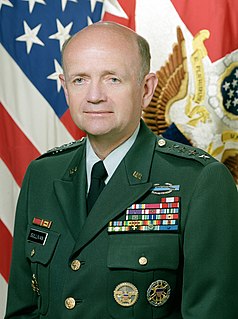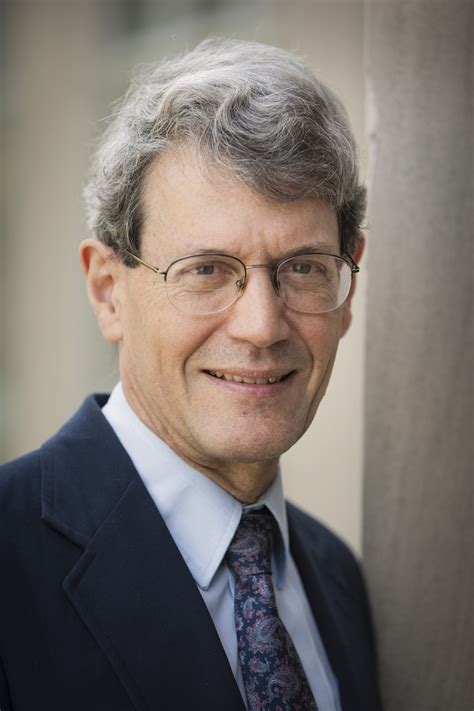Top 1036 Uncertainty Quotes & Sayings - Page 18
Explore popular Uncertainty quotes.
Last updated on April 20, 2025.
People are saying that they want be convinced [about global warming], perfectly. They want to know the climate science projections with 100 per cent certainty. Well, we know a great deal and even with that there is still uncertainty. But the trend line is very clear. We never have 100 per cent certainty. We never have it. If you wait till you have 100 per cent certainty, something bad is going to happen on the battlefield. That's something we know. You have to act with incomplete information. You have to act based on the trend line.
I think it's much more interesting to live not knowing than to have answers which might be wrong. I have approximate answers, and possible beliefs, and different degrees of uncertainty about different things, but I am not absolutely sure of anything. There are many things I don't know anything about, such as whether it means anything to ask "Why are we here?" I might think about it a little bit, and if I can't figure it out then I go on to something else. But I don't have to know an answer. I don't feel frightened by not knowing things, by being lost in the mysterious universe without having any purpose - which is the way it really is, as far as I can tell.
Um. Charles thinks that his wolf has chosen me as his mate." "In less than one full day?" It did sound dumb when he said it that way. "Yes." she couldn't keep the uncertainty of her her voice, though, and it bothered Charles. He rolled to his feet and growled softly. "Charles also said I was an Omega wolf she told his father. That might have something to do with it as well." Silence lengthened and she began to think tha the cell phone might have dropped the connection. Then the Marrok laughed softly. "Oh his brother is going to tease him unmercifully about this.
Fear comes from uncertainty; we can eliminate the fear within us when we know ourselves better. As the great Sun Tzu said: “When you know yourself and your opponent, you will win every time. When you know yourself but not your opponent, you will win one and lose one. However, when you do not know yourself or your opponent, you will be imperiled every time.
Many of life's decisions are hard. What kind of career should you pursue? Does your ailing mother need to be put in a nursing home? You and your spouse already have two kids; should you have a third?such decisions are hard for a number of reasons. For one the stakes are high. There's also a great deal of uncertainty involved. Above all, decisions like these are rare, which means you don't get much practice making them. You've probably gotten good at buying groceries, since you do it so often, but buying your first house is another thing entirely.
Things do fall apart. It is in their nature to do so. When we try to protect ourselves from the inevitability of change, we are not listening to the soul. We are listening to our fear of life and death, our lack of faith, our smaller ego's will to prevail. To listen to the soul is to stop fighting with life-to stop fighting when things fall apart, when they don't go our way, when we get sick, when we are betrayed or mistreated or misunderstood. To listen to the soul is to slow down, to feel deeply, to see ourselves clearly, to surrender to discomfort and uncertainty, and to wait.
Sometimes differences arise partly from incomplete information. We are finite. And we should admit that there are cases of uncertainty. But often the differences become exacerbated because of sinful inclinations underneath the surface, which incline us to prefer our own ideas and not to submit to what is less comfortable. We must be cautious about accusing anyone else of sin. We don't know people's hearts. But we must also avoid being naïve about the subtlety of sin and the corrupting effects of sin on the mind - our own minds, not only the mind of the other fellow.
Americans across our country are feeling a sense of helplessness, of uncertainty and of fear. These feelings are understandable and they are justified. But the answer must not be violence. The answer is never violence. Rather, the answer - our answer, all our answer - must be action. Calm, peaceful, collaborative and determined action. We must continue working to build trust between communities and law enforcement. We must continue working to guarantee every person in this country equal justice under the law.
I still don't like the word agnostic. It's too fancy. I'm simply not a believer. But, as simple as this notion is, it confuses some people. Someone wrote a Wikipedia entry about me, identifying me as an atheist because I'd said in a book I wrote that I wasn't a believer. I guess in a world uncomfortable with uncertainty, an unbeliever must be an atheist, and possibly an infidel. This gets us back to that most pressing of human questions: why do people worry so much about other people's holding beliefs other than their own?
An atheist is someone who is certain that God does not exist, someone who has compelling evidence against the existence of God. I know of no such compelling evidence. Because God can be relegated to remote times and places and to ultimate causes, we would have to know a great deal more about the universe than we do now to be sure that no such God exists. To be certain of the existence of God and to be certain of the nonexistence of God seem to me to be the confident extremes in a subject so riddled with doubt and uncertainty as to inspire very little confidence indeed.
The superpowers often behave like two heavily armed blind men feeling their way around a room, each believing himself in mortal peril from the other, whom he assumes to have perfect vision. Each side should know that frequently uncertainty, compromise, and incoherence are the essence of policymaking. Yet each tends to ascribe to the other a consistency, foresight, and coherence that its own experience belies. Of course, over time, even two armed blind men can do enormous damage to each other, not to speak of the room.
At times it may seem worse - harder, at least - to live through the despair of this loss without the temporary comfort of our addictive behaviour. We cannot drown our sorrows. We must face the fact that we don’t know, really, where we are, how we got here, how long the pain will last, or how to move past it. That uncertainty may be the most painful part of not knowing a God: no one is there to reassure us that a God will take the pain and confusion away. We simply don’t know. And we have no way to numb ourselves or to forget the condition we’re in.
Wish you could turn off the questions, turn off the voices, turn off all sound. Yearn to close out the ugliness, close out the filthiness, close out all light. Long to cast away yesterday, cast away memory, cast away all jeapordy. Pray you could somehow stop uncertainty, somehow stop the loathing, somehow stop the pain. Act on your impulse, swallow the bottle, cut a little deeper, put the gun to your chest.
The psychology of the saver and the psychology of the investor is very closely connected with Keynes' distinction between risk and uncertainty. When the future is uncertain, he thought that a lot of saving would be directed towards securing, securing more, getting more security in the present, rather than building wealth in the future, which was the classical view, you save in order to invest, in order to consume more later on. What he had called the propensity to hoard or liquidity preference would normally be stronger than the inducement to invest.
I think our brains does have a tendency to be true to its own ideas and statements. Everything we do and everything we think about is a belief. Until we get to the point where we look beyond our own ego-self, and to some degree beyond our own mind, we are always going to make assumptions and have beliefs to make our brains feel more comfortable. And if we can get to a point where we embrace that uncertainty and doubt, and be willing to learn from that and to explore that, I think that that could be a very positive experience.
We don't always know the details of our future. We do not know what lies ahead. We live in a time of uncertainty. We are surrounded by challenges on all sides. Occasionally discouragement may sneak in to our day; frustration may invite itself into our thinking; doubt might enter about the value of our work. In these dark moments Satan whispers in our ears that we will never be able to succeed, that the price isn't work the effort, and that our small part will never make a difference. He, the father of all lies, will try to prevent us from seeing the end from the beginning.















